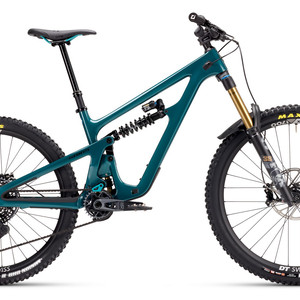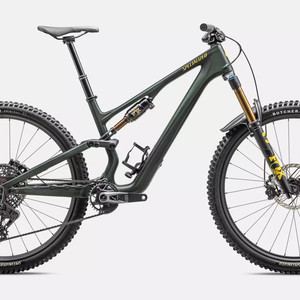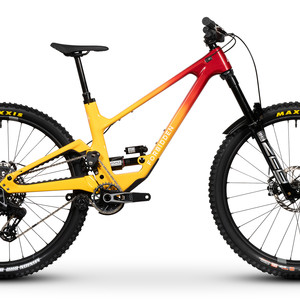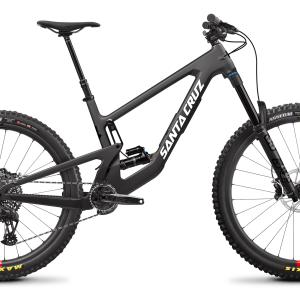2021 Rocky Mountain Altitude Carbon 90 Rally Edition
(discontinued)
| Where To Buy | |||
|---|---|---|---|
Free shipping on orders over $50 (continental U.S. only).
International shipping available. Some exclusions apply. |
|||
Free shipping on orders over $50 (continental U.S. only).
International shipping available. Some exclusions apply. |
|||

Are you ready to Rally? Rocky Mountain is. The proof? Let's talk about the all-new Rocky Mountain Altitude. Jesse Melamed just won the first EWS of 2020 on this bike, giving it "legit" status. But, since we all love to obsess over seat angles and anti-squat charts, we’ve got your back. We're going to run through the details of our size Large and see just how Rocky’s new 160/170mm travel mountain bike handles the varied terrain thrown at it.
Strengths
| Weaknesses
|


Highlights
- Full-carbon frame, alloy models available
- 29-inch wheels (tested), 27.5-inch wheel versions available in small and medium sizes
- 160mm (6.2-inches) of rear wheel travel // 170mm (6.7-inches) front travel
- FOX Float X2 Factory rear shock
- FOX 38 Float EVOL Grip 2 Factory fork, 44mm offset (37mm on 27.5-inch options)
- Smoothlink suspension system
- Internal cable routing (guided on carbon models, large port on alloy)
- RIDE9 geometry adjustment with nine geometry configurations
- Integrated frame protection and Canadam shield
- Press-fit bottom bracket BB71
- 2-bolt ISCG05 tabs
- OneUp top guide with ISCG bash guard
- 203mm Rotors
- Weight: 31 lb, 11 oz / 14.37 kg (without pedals, size Large tested)
- Price: $9,099 as tested

Rocky Mountain sent us the Altitude Carbon 90 Rally Edition which retails for just over $9,000 USD. Looking at the spec sheet alone, this is built for a hard-charging rider and racer. The baller spec is highlighted by maple-syrup-colored graphic touches while the tires and suspension are a direct reflection of Rocky’s EWS team and their influence on this particular build.
In a shout-out to riders with a budget, elsewhere in the 2021 Altitude line is the Alloy 30 starting at $3,499 US. There’s a coil-shocked Carbon 70 version for $7,000, and the SRAM AXS-equipped Carbon 99 drains the bank at a cool $10,000.

Size small Altitudes have their own, super-low front triangle and are offered in a 27.5-inch wheel size only. Mediums come in both 27.5 or 29-inch wheels while large and XL are 29ers.


It’s clear that Rocky has put a lot of thought into how this bike is offered with sizes and models. That’s just the beginning though. The Altitude uses their RIDE9 adjustment system that, allows for nine different geometry positions. NINE. Rocky’s geometry chart hits the bases with Slack, Neutral and Steep references. For simplicity, we stuck with Slack mode, and here’s how the bike looks by the numbers:
- Seat Angle: 75.4 degrees
- Head Angle: 64.4 degrees
- Reach: 474mm
- Chainstay: 438mm/449mm
- Seat Tube Length: 445mm

Want more tweaking? Sure thing. The Altitude has a 10mm chainstay length adjustment. We ran ours in short, to keep things nimble. A rad, little sidenote is that the upper shock mount on the carbon frames is removable to “allow for future kinematic updates,” so there may be ANOTHER forthcoming way to tune the Altitude.

Piling on even more adjustments are the robust and refined FOX 38 Float EVOL Grip2 fork and FOX Float X2 Factory shock. These are not “set sag, click a rebound or two and go shred” pieces of suspension. The fork and shock are highly tunable with high- and low-speed compression and high- and low-speed rebound adjustment, not to mention air-volume tweaks that can be made with spacers.


Set Up
With all the adjustments, it can be easy to get lost in a loop of nothing but knob twisting and tinkering, always wondering if the sweet spot has really been found. Since we’ve only been on the bike for two weeks, we’ve barely had time to scratch the surface of a personalized setup. We did use a Quarq ShockWiz to provide some computer-based feedback and found that our initial settings were on point for the terrain we were riding.
Speaking of knob twisting, the FOX Float X2 doesn’t really have knobs to twist. The high-speed rebound knob is inaccessible for adult fingers because the Altitude’s linkage is in the way, requiring a tool to spin it. All other adjustments require hex wrenches. The serious suspension nerd probably won’t care about such inconveniences, but someone coming from a more easily tunable bike will have a learning curve. The more budget-friendly alloy Altitude models and the Carbon 50 with Float DPX2 shocks will make life a little simpler for those easily overwhelmed by endless suspension tweaks.


We were sent the aptly named RALLY Edition of the Altitude, and that name should not be taken lightly. The serious enduro racer, excited to find the perfect squish performance for every track, will love the tunability of the high-end FOX goods. They’ll also appreciate the tire spec - a Maxxis DHF / DHR II combo, both featuring DoubleDown casing and MaxxGRIP rubber compound. These tires are no joke when it comes to traction and flat prevention. They’re not light, they roll slowly and they wear fast.

The tires are designed to grab on to slick roots and rocks and keep the rider upright in hare-ball situations to win races. In our dusty, dry riding conditions, we saw the rear tire degrading after just a few rides, which is not a surprise. While we appreciate the grip, the MaxxGRIP tires aren’t a wise choice for riders looking for a combination of speed, durability and traction. The tire spec on the other Altitude models hits a more realistic target with MaxxGRIP front tire, MaxxTerra rear and EXO+ casings. It should be noted that our front tire had a wobble. While not felt on the trail, and never unseated, the wobble is visible.

The Shimano XTR drivetrain and brakes perform very well. Shifting is crisp and there’s never a second thought about accuracy. Our Rally edition uses the quiet OneUp top guide, but also includes a lower ISCG bashguard for extra protection. The 4-piston XTR Trail brakes stop on a dime and were fade-free on our rides. They have an on-off feeling, but it’s predictable and something we appreciate when things get rowdy. The rattling of the finned pads is pretty annoying, which is why we see so many silencing mods on pro bikes in our World Cup and EWS PIT BITS reports.


The alloy Race Face Turbine R 30 wheels feature the fast-engaging Vault hub which we’ve grown to love. The 30mm rim width is what we’d expect for a bike of this caliber, and we’re fans of alloy rims for their ability to take a beating and bending before failing, leaving a bike unrideable. The Turbine’s signature design use 28 spokes that are 3-cross, but the spokes don’t touch each other. They have high tension creating a strong but compliant ride. The trade-off, however, is audible on the trail. When a wheel takes a hit or flexes, the spokes ping and poing. It’s a sound that may not be for everyone, and it takes some getting used to. We managed to knock the rear wheel slightly out of true, but a re-tension brought it back to normal.



The Race Face cockpit feels right at home with the Canadian build, but the Ergon grips are on the firm and rough side, especially considering the type of abuse the Altitude is made for.


On the Trail
So, how does this new Altitude ride? We rode the attack-dog-machine at rough, gravity-fed bike parks, on speedy flow trails and local singletrack for testing. As advertised, this bike is ready to RALLY. We only had the bike for two weeks and managed a handful of rides, so diving into the full range of adjustments just wasn’t possible with our short time frame.
The Altitude is meant to be ridden hard and comes alive with aggressive rider input.

The Altitude is meant to be ridden hard and comes alive with aggressive rider input. It proved to be very snappy in corners while handling bigger hits thrown at it. Our bike was never overcome, but on the roughest tracks, it felt like it had a bit less travel than advertised, though we never felt it bottom-out harshly.

The Altitude, in our Rally configuration, is not made for a passenger. It’s made for a pilot. The Rocky wasn’t as lively in jump and flow trail scenarios as we’d hoped, however. Having just come off the very playful Trek Slash, the Rocky had a more damped and business-like feel on flow trails, requiring aggressive movements to get far enough into the suspension to boost off lips. Volume spacer and low-speed suspension adjustments could be a solution if we rode flow trails more often, and these are settings we will dig into with more time on the bike. Keeping true to their intent, the tires on our Rocky are definitely more sluggish in flow applications when compared to the Trek.
The Altitude, in our Rally configuration, is not made for a passenger. It’s made for a pilot.



When it came to fire road climbs, we experienced pedal bob when the shock was open. The compression lever on the Float X2 helps negate the action on sustained ascents with prolonged seated climbing. On singletrack and technical trails, the climbing traction was excellent. When standing and sprinting on the trail, the Altitude responds with excitement, as if morphed into a shorter-travel bike.
Always the hot topic these days is seat angle. Rocky claims a 75.4-degree seat angle in “slack” mode, which is borderline heresy these days. Was it a problem on the trail? Nope, not at all. Did that seat angle just win an Enduro World Series? Yep, it did (with a little help from Jesse Melamed). We’re always going to analyze numbers on paper, but we value real-world experience and our experience indicates this seat angle is more than acceptable. For what it’s worth, our low-budget Photoshop effective seat angle measurement put us at 76.4 degrees where the bike was ridden with about an inch of seat post extension from fully slammed.

What's the Bottom Line?
If you’re looking at the $9,099 Carbon 90 Rally Edition we tested, you’re a tuning perfectionist ready to put some serious hurt down on some serious trails. Nine different geometry positions, a 10mm chainstay adjustment and the full-scale tuning of the FOX Factory suspension means the perfect setting for any trail or condition is at your fingertips (or at least your tool tips). Riders looking for a versatile, strong-performing long-travel mountain bike with a little more simplicity should investigate the other models of the new Altitude that start at $3,499.
The Rocky Mountain Altitude is an extremely adjustable and capable enduro bike and Rocky Mountain has made sure there’s a build to fit your needs. Head to bikes.com to learn more and discover the complete Altitude line.
About the Tester
Kevin Lillywhite - Age: 40 // Years Riding: Enough to know better // Height: 5'11" (1.8m) // Weight: 168-pounds (76.2kg)
Kevin rides bikes real nice. What's more important, style or beating the clock? For Kevin, they seem to be one in the same. Creative line choices and a propensity for speed have Kevin decoding Vital's test bikes with the best of them. With a background in BMX and a current love for mountain bikes, Kevin is a fan of toys with wheels and just loves laying it down for Boise, Idaho.
Video and Photos by gordo and Steve Tenuto
Specifications
Full guided internal cable routing
Integrated downtube protection, noise canceling chainstay protection, "Canadian Shield yoke protection, and downtube shuttle guard
Rear: Maxxis Minion DHR II 2.4" WT 3C MaxxGrip DD Tubeless Ready
Travel: 125mm (size S), 150mm (size M), 175mm (size L-XL)
Gloss Black Dog/Matte Black Dog/Gloss Rust from the Rain
1-year for frame hardware (pivots, axles, etc...)
| Where To Buy | |||
|---|---|---|---|
Free shipping on orders over $50 (continental U.S. only).
International shipping available. Some exclusions apply. |
|||
Free shipping on orders over $50 (continental U.S. only).
International shipping available. Some exclusions apply. |
|||

































11 comments
Post a reply to: PILOTS WANTED - 2021 Rocky Mountain Altitude Carbon 90 Rally Edi